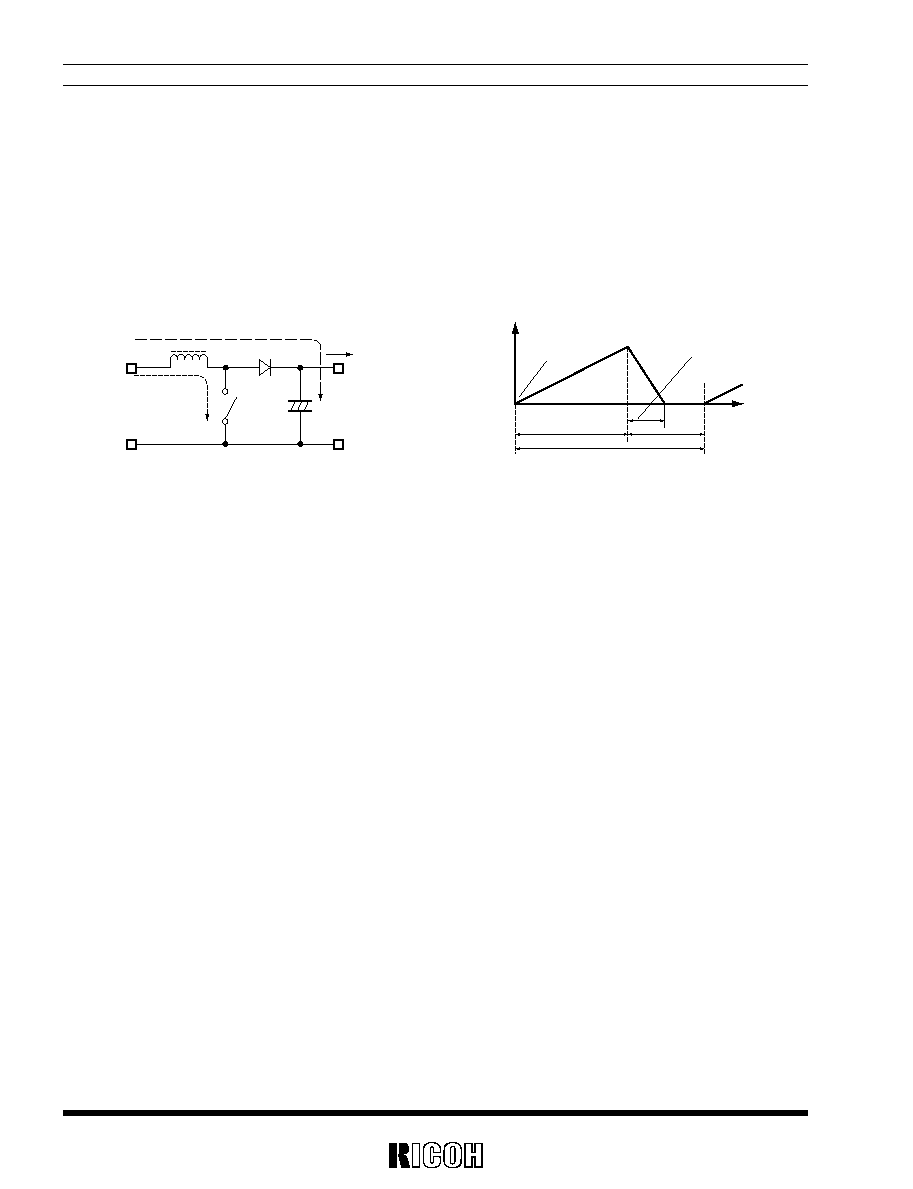- 您現(xiàn)在的位置:買(mǎi)賣(mài)IC網(wǎng) > PDF目錄225036 > RH5RI313B-T1 (RICOH COMPANY LTD) 0.25 A SWITCHING REGULATOR, 100 kHz SWITCHING FREQ-MAX, PDSO5 PDF資料下載
參數(shù)資料
| 型號(hào): | RH5RI313B-T1 |
| 廠商: | RICOH COMPANY LTD |
| 元件分類(lèi): | 穩(wěn)壓器 |
| 英文描述: | 0.25 A SWITCHING REGULATOR, 100 kHz SWITCHING FREQ-MAX, PDSO5 |
| 封裝: | SOT-89, 5 PIN |
| 文件頁(yè)數(shù): | 3/24頁(yè) |
| 文件大?。?/td> | 179K |
| 代理商: | RH5RI313B-T1 |
第1頁(yè)第2頁(yè)當(dāng)前第3頁(yè)第4頁(yè)第5頁(yè)第6頁(yè)第7頁(yè)第8頁(yè)第9頁(yè)第10頁(yè)第11頁(yè)第12頁(yè)第13頁(yè)第14頁(yè)第15頁(yè)第16頁(yè)第17頁(yè)第18頁(yè)第19頁(yè)第20頁(yè)第21頁(yè)第22頁(yè)第23頁(yè)第24頁(yè)

10
OPERATION OF STEP-UP DC/DC CONVERTER
Step-up DC/DC Converter charges energy in the inductor when Lx Transistor (LxTr) is on, and discharges the
energy with the addition of the energy from Input Power Source thereto, so that a higher output voltage than the
input voltage is obtained.
The operation will be explained with reference to the following diagrams :
< Current through L >
< Basic Circuits >
RH5RI
i2
L
SD
IOUT
VOUT
CL
Lx Tr
i1
VIN
IL
ILmin
ILmax
topen
t
ton
toff
T=1/fosc
Step 1 : LxTr is turned ON and current IL (=i1 ) flows, so that energy is charged in L. At this moment, IL(=i1 )
is increased from ILmin (=0) to reach ILmax in protection to the on-time period (ton) of LxTr.
Step 2 : When LxTr is turned OFF, Schottky diode (SD) is turned on in order that L maintains IL at ILmax, so that
current IL (=i2) is released.
Step 3 : IL (=i2) is gradually decreased, and IL reaches ILmin (=0) after a time period of topen, so that SD is
turned OFF.
In the case of VFM control system, the output voltage is maintained constant by controlling the oscillator fre-
quency (fosc) with the on-time period (ton) being maintained constant.
In the above two diagrams, the maximum value (ILmax) and the minimum value (ILmin) of the current which
flows through the inductor are the same as those when LxTr is ON and also when LxTr is OFF.
The difference between ILmax and ILmin, which is represented by
I, is:
I=ILmax–ILmin=VIN ton/L=(VOUT–VIN) topen/L ..........................................Equation 1
wherein T=1/fosc=ton+toff
duty (%)=ton/T 100=ton fosc 100
topen
≤toff
In Equation 1,VIN ton/L and (VOUT –VIN) topen/L are respectively the change in the current at ON, and the
change in the current at OFF.
In the VFM system, topen < toff as illustrated in the above diagram. In this case, the energy charged in the
inductor during the time period of ton is discharged in its entirely during the time period of toff, so that ILmin
becomes zero (ILmin=0).
相關(guān)PDF資料 |
PDF描述 |
|---|---|
| RH5RI331B-T2 | 0.25 A SWITCHING REGULATOR, 100 kHz SWITCHING FREQ-MAX, PSSO3 |
| RH5RI332B-T1 | 0.05 A SWITCHING CONTROLLER, 100 kHz SWITCHING FREQ-MAX, PSSO3 |
| RH5RI421B-T1 | 0.25 A SWITCHING REGULATOR, 100 kHz SWITCHING FREQ-MAX, PSSO3 |
| RH5RI422B-T2 | 0.05 A SWITCHING CONTROLLER, 100 kHz SWITCHING FREQ-MAX, PSSO3 |
| RH5RI723B-T2 | 0.25 A SWITCHING REGULATOR, 100 kHz SWITCHING FREQ-MAX, PDSO5 |
相關(guān)代理商/技術(shù)參數(shù) |
參數(shù)描述 |
|---|---|
| RH5RI321A | 制造商:未知廠家 制造商全稱(chēng):未知廠家 功能描述:Analog IC |
| RH5RI322B | 制造商:未知廠家 制造商全稱(chēng):未知廠家 功能描述:Analog IC |
| RH5RI323B | 制造商:未知廠家 制造商全稱(chēng):未知廠家 功能描述:Analog IC |
| RH5RI331A | 制造商:未知廠家 制造商全稱(chēng):未知廠家 功能描述:Analog IC |
| RH5RI332B | 制造商:未知廠家 制造商全稱(chēng):未知廠家 功能描述:Analog IC |
發(fā)布緊急采購(gòu),3分鐘左右您將得到回復(fù)。